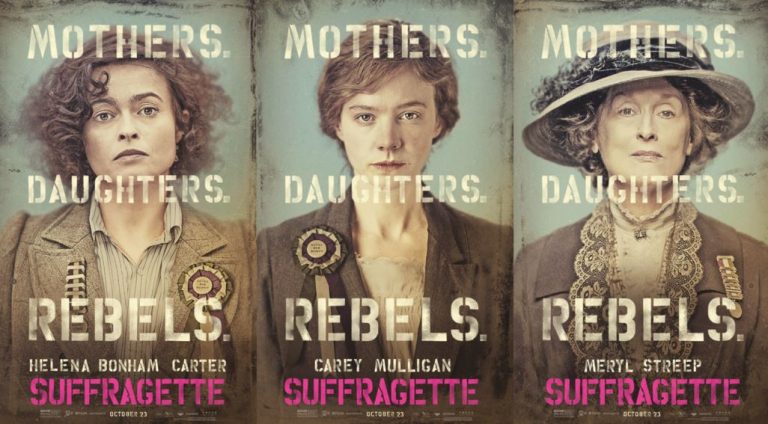Bondage! Dwarves! Ketamine! But enough about the new Macbeth, more about this year’s cinematic triumph that is Suffragette, the riotous historical drama armed with a glittering cast that expertly depicts the suffragettes’ battles to enfranchise women. In an emotionally nuanced performance, Carey Mulligan cements her status as one of British cinema’s eminent stars. Barring a lack of political context, the film is a triumphant union of politics and art.
Set in London’s east end during the middle of the First World War, Suffragette revolves around Maud (Carey Mulligan), a working-class washer-woman living in Bethnal Green. Encouraged to join the Suffragettes by fiery co-worker Violet (the supreme Anne-Marie Duff), Maud’s initial scepticism gradually dissolves as a demonstration after a speech draws her further into political activism. The launderette where Maud and Violet work is brilliantly designed, accurately highlighting the appalling conditions working-class women were subjected to on a daily basis.
Suffragete’s greatest success is its depiction of the state’s brutal repression of the movement. Brendan Gleeson is typically magnificent as Inspector Arthur Steed, the kindly face of state sponsored viciousness whose distaste for the law does not inhibit him orchestrating the crushing of peaceful demonstrations. We watch as her comrades like Edith (the excellent Helena Bonham-Carter) are beaten and harassed, as police and activists play a bloody game of cat and mouse.
It is depressing to say that the film reinforces the embarrassing fact that women’s rights campaigners received little support from men, be it their husbands, bosses or politicians. 2010’s Made in Dagenham features a similar motif, in which working-class women fighting for equal pay received little to no support from their spouses and condescension from sneering bosses. Ben Whishaw is utterly convincing as Maud’s husband Sonny, an emblem of working-class patriotism whose pride is undermined by Maud’s quest for empowerment. Sonny and Maud’s relationship disintegrates as Maud’s ‘notoriety’ grows, emasculating Sonny at home and particularly at work. What’s clear in both films is that the male ego was presented as being under threat by an organised band of women who challenged established gender roles.
Disappointingly, a lack of political context dilutes the significance of the suffragettes’ battles. Their struggles are quarantined in a vacuum, in a time and place seemingly untouched by the First World War. Focusing on a select band of suffragettes saves those overlooked by historians from obscurity, but one wonders whether it had to come at the expense of context. Some more information would’ve framed the savage extent of state reprisals better, but instead the narrative is somewhat diluted.
Director Sarah Gavron makes it clear that political activism and motherhood are, at best, irreconcilable. Maud’s journey from reluctant participant to strident campaigner comes at the expense of domestic stability, as she struggles to balance home life with political commitments. When Maud dances in the rain for her son who stares delightedly from the house from which she’s banished, the compatibility between motherhood and political activism is shattered, motherhood asphyxiated by rigid, male-established rules. The disappointing decline of Violet is one of the film’s weaknesses. Her fiery nature evaporates in the embrace of motherhood, fading in a disturbingly rapid fashion that further strains the relationship between motherhood and political activism.
Emmeline Pankhurst (Meryl Streep) is surprisingly absent for most of the events and when she does appear, proves to be the least sympathetic member of the movement. She is an invisible figurehead, ordering her charges from the shadows while foot soldiers like Maud and Violet get hurt. The suffragettes look up to Pankhurst, but we are meant to view Maud, Edith and Violet as the heroes, rather than Pankhurst. Gavron resists the cult of Pankhurst, shining a light on those less well-known names who did so much for the cause.
While promoting Suffragette, Mulligan rightly argued that women’s history should be taught in schools. The aims, movement and figures should be embedded in future students’ minds, whether they turn out to be political firebrands or not. Gavron successfully shows how suffragettes sacrificed families and jobs and battled the sexist political class to enfranchise women of the future. Thanks to Mulligan, Duff et al, the cause is sanctified in this sublime work of art.
Some of the coverage you find on Cultured Vultures contains affiliate links, which provide us with small commissions based on purchases made from visiting our site.

